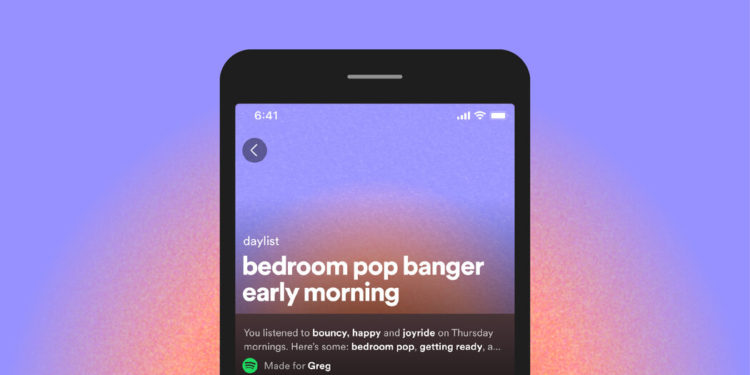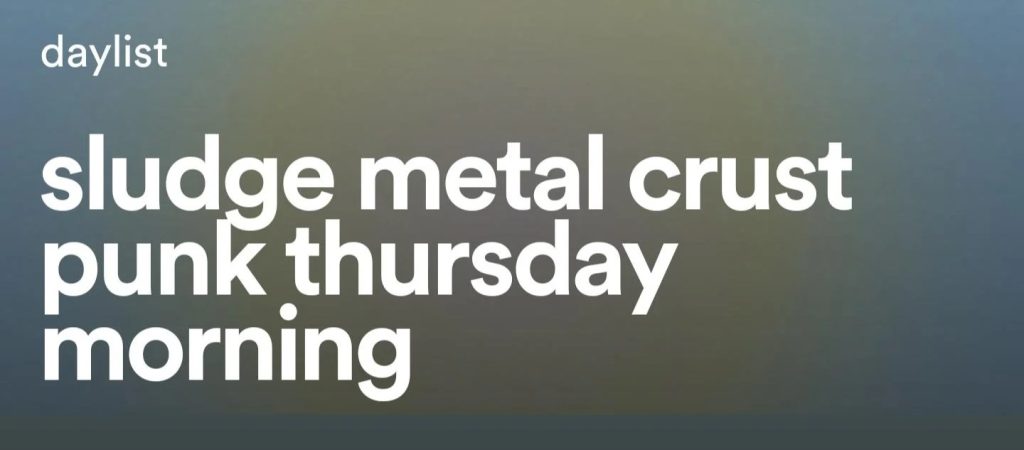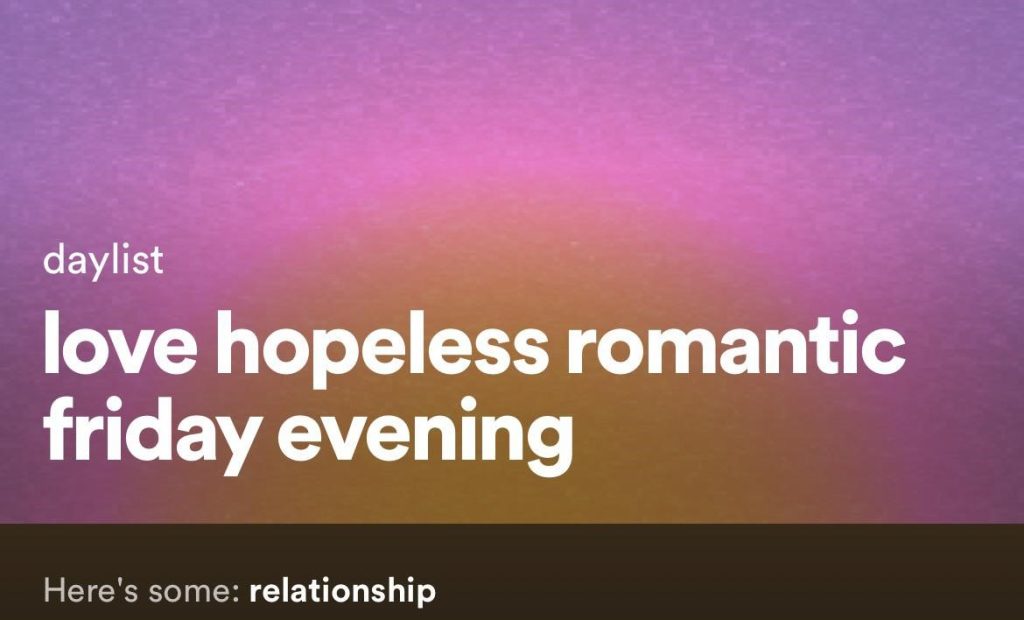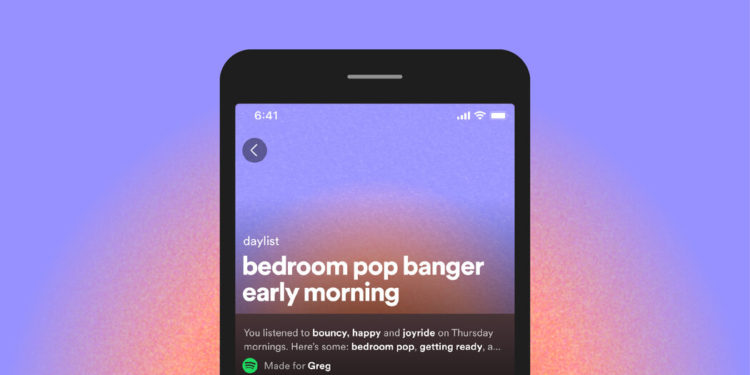Spotify introduces its new “daylist” feature, delivering users three personalized playlists each day, each with titles that range from quirky to bewildering.
Have you ever felt the “Sunday scaries” evolving into a “Nervous Ocean Monday Morning”? Is the weekend defined by Friday or a “dirty rock happy indie thursday evening”? And what’s the suitable attire for a “Folklore soul crushing afternoon”?

The unusual phrases serve as titles for Spotify’s innovative feature called “daylists.”
With this feature, users receive three uniquely titled playlists each day, generated algorithmically by Spotify. The distinctive and specific titles often invite users to capture and share them due to their intriguing nature.
The intriguing titles of these playlists have gained significant traction on social media, propelling the service to newfound popularity approximately four months after its launch in September. Users, in numerous posts, express their amusement at the feature’s seemingly perceptive ability to understand and reflect their preferences.
One X user commented, saying, “Spotify called me out a little bit with this daylist.” The playlist’s title: “Midwest Emo Flannel Tuesday Early Morning.”
Someone expressed the feeling of being “personally bullied” by Spotify when encountering a collection of songs titled “Tailspin Self-Sabotaging Monday Afternoon.”
Ever wondered who’s behind the peculiar titles of Spotify’s daily playlists? Surprisingly, or perhaps not, it’s artificial intelligence (A.I.) generating those quirky names.
“Spotify employs machine learning to weave through a multitude of descriptors, concocting the distinctive names for the daylist playlists,” explained Molly Holder, a senior product director at Spotify. She described the titles’ tone as “hyper-personalized, dynamic, and playful.”
Ms. Holder mentioned that the team responsible for these whimsical playlists comprises data scientists and music experts. They identify musical descriptors based on genre, mood, and themes, which are then associated with specific tracks using methods like music expert annotation, sonic similarity, and trends.
“In our view, the titles provide users with a playful means to express their unique audio identity,” Ms. Holder explained.
In general, users have been interpreting the titles in a skeptic manner.
Chelsy McInnis from St. Louis expressed, “It seems like Spotify kind of, like, made up these musical genres.”
Ms. McInnis, a marketing professional and dedicated Spotify user for the past decade, began using the daylist feature in September. She checks it three times a day.
“My morning title is completely different than my afternoon title, which is completely different than my evening title,” Ms. McInnis shared. “And it’s just, like, super fun to see kind of what it spits out at me.”
Daylist extends the success of Spotify Wrapped, an annual review of a user’s personalized listening history introduced in 2016, which has become a social media tradition. Spotify Wrapped compiles listening data, like a user’s top artist or most-listened-to music genres, and presents it in shareable Instagram-friendly formats. Last year, it was accompanied by “sound town,” assigning users a city where others share similar musical tastes or artists.


Daylists align with Spotify’s broader emphasis on hyper-specificity. Molly Holder noted that four out of five Spotify users highlight the platform’s personalized offerings as their favorite aspect of the brand.
But a playful brand voice can be a dangerous proposition for corporations, who risk running afoul of consumer sensitivities with each cheeky ad or brazen tweet. With great brand identity comes great responsibility.“I got ‘Fun Purim Thursday Morning,’” said Shayna Weiss, senior associate director of the Schusterman Center for Israel Studies at Brandeis University. “I was like, ‘What does this even mean?’ Purim is a fun Jewish holiday, but using it was, like, the weirdest way to describe a music vibe early in the morning.”Dr. Weiss later received an afternoon playlist titled “Witchy Ethereal Tuesday,” to which she exclaimed, “What does it mean — that I listen to forests?”
She naturally posted it on social media.
Kyle Stanley, a Ph.D. candidate at Louisiana State University specializing in digital and media popular culture, joined Spotify a year ago after witnessing his friends share their Spotify Wrapped.
“The marketing on Instagram got me,” said Mr. Stanley, who was previously an Apple music user.
Mr. Stanley frequently shares his daylist on social media, often utilizing the more private Close Friends feature on Instagram, depending on the level of chaos in the title. He attributes the daylist’s social media popularity to its ability to offer a more nuanced understanding of an individual through music.
“Getting insight into your personality a little bit more deeply than just once a year, and having these curated playlists multiple times every single day with a funny title, it draws people in and makes them want to be a part of this,” he said.
Mauricio Godoy, residing in Brooklyn, delved into his personalized daylist on Monday after witnessing friends share theirs on social media. His daylist titles for the day were “Shoegaze Indie Tuesday Morning” and “Post-Punk Far Out Tuesday Afternoon.”
He expressed anticipation for the evening daylist title, drawing parallels to the quirkiness of mixtape titles.
“I’m reminded of how the mixtapes always had a quirky title,” Mr. Godoy said, “and there was always a funny title that caught your attention when you pulled out your burned CD playlist. I think that’s kind of what these daylist titles are doing now.”



